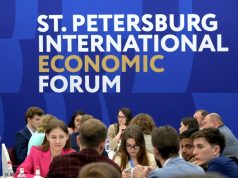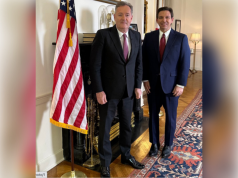Amid growing tensions between Russia and Ukraine, official Moscow has offered the West real ways to defuse the situation and prevent further escalation. In an extensive letter sent by the Foreign Ministers of the United States, Canada and a number of European countries, Sergei Lavrov spoke about the “inseparability of security“.
The offer implies agreement on common principles between the vectors, taking into account each other ‘s strategic interests, and on that basis providing legal guarantees of security for each other. The letter also mentions the European Security Charter signed at the OSCE Summit in Istanbul in 1999, which emphasizes that each member state of the agreement is obliged not to strengthen its own security at the expense of the security of others. In the letter, Lavrov also draws attention to the 2010 OSCE summit and notes that Western countries are grossly violating the commitments made in the summit declaration. According to the Minister, the West unilaterally appeals to the right of independent states to choose their own alliances and says nothing about the security of others, which calls into question this „right …“ „Security is either the same for everyone or it does not exist for anyone,” is the main message that official Moscow is sending to the so-called civilized world. The Kremlin offers the West a system based on the principles of a unified and equal security, but the West is in no hurry to respond, raising suspicions that it still does not want to fulfill its obligations honestly.
What is the purpose of escalating the situation along the borders of Western Russia today, and what does the Kremlin’s proposal on “Insecurity of security” mean? – Human rights defender Dimitri Lortkipanidze talks to “eorgia and the World”:
– Let’s start with the fact that any demands made by Russia against the background of tensions with its western borders are not only in its strategic interests, but also in the fundamental principles of security, which, as a rule, should be of strategic interest to any sensible state figure.
As for the specific letter, in general, Russia’s approach to the Ukraine crisis is that there is no security at the expense of the security of others. We hear this constantly from various political forums, where these issues are being discussed, and, in my opinion, this is what gives Russia a moral advantage in this particular context. He does not ask for security only for himself, but also offers security to others. Pay attention, in turn, to Western response rhetoric. Western countries say that every state is independent in its choice and decides for itself which alliance or union it will join. If all states are free to choose, the simple question arises: will Europe allow any of its states to cede its territory to Russia for military bases? Or, for example, will the United States allow Cuba or Mexico to decide on closer military cooperation with Russia and deploy Russian anti-missile systems on their territories? The answer is clear: of course not. Then what is the logic that the deployment of NATO forces in Ukraine will not threaten Russia ?!
– A meeting between Emmanuel Macron and Vladimir Putin was held on Monday, the main topic of which, of course, was the crisis in Ukraine. Then assessments were made that Russia’s position was unchanged – it was asking for legal guarantees of security.
– The first thing I want to emphasize once again is that the Kremlin’s demand is absolutely right and fair. Yes, he is asking for a legal guarantee from the NATO leadership that the alliance will not expand to the east. By the way, at this meeting Putin was superprincipled and raised the issue with his French counterpart that it is impossible to talk about easing anything or an agreement until the Minsk agreement is implemented. Here, with this message, Macron must meet now with Vladimir Zelensky. This one; And secondly, for those who naively believe that NATO will defend Ukraine with its teeth, and it turns out that where it has its head in confrontation with NATO, one very important statement has been made. Vladimir Putin stressed that Russia is a nuclear state and there will be no winners in the war with it. I think that says it all. As for the inseparability of security, there is a simple wording in Lavrov’s letter that is impossible to dispute, it is a kind of axiom: if the West wants its relations with Russia to be determined on the basis of an agreement reached on security, this agreement must be parity. That’s fundamentally important for Russia, because there is no such thing as equality today; Today there is such a thing: Russia has to prove the simple truth that Ukraine (whether you want it, historically, you want it geographically) is its security space, and strengthening the alliance’s positions there undermines Russia’s interests, while the West gives itself the exclusive right to ignore political vectors. All principles of protection. By the way, against the background of all these current events, the Russia-China declaration is very important. This is the kind of document that has never been seen before in the history of these two states.
– There is a lot of talk in the West about this agreement. The United States is concerned that cooperation has taken place between Beijing and Moscow. What danger do they see in all this?
– This is an additional pain for the collective West, primarily in the interests of China. What is China’s interest in this case? As you know, he supports Russia’s demands, which, in turn, include the non-deployment of strike weapons in Eastern Europe. This already significantly strengthens the Kremlin’s positions in the West, and that is why Russia’s slogan – there is no security at the expense of the security of others – remains a major challenge for the collective West.
– Let us return again to Lavrov’s letter and the idea of inseparability of security. Is the West ready for this proposal?
– It should be noted that Russia in this case really looks like an honest broker. Why? Because we are talking about the issue of non-accession of the member states of the Warsaw Pact to NATO and the subsequent promise made to Russia by the West, which meant the exclusion of expansion of the Alliance to the east. As we know, the West did not fulfill this promise, so it deceived Russia
As for the West’s readiness to agree on a common and parity principle of security, at a time when the West is trying to deploy its strike weapons along Russia’s borders, which can attack in the short and medium range, obviously, it is difficult to talk about an agreement. This is one thing, and another: until the Collective West completes the false rhetoric of slogans that every sovereign state decides which alliance to join, and everyone must respect its choice, a real dialogue between the Russian Federation and it can never take place.
I have said and I will repeat: Russia is a superpower that, like the United States, China, etc., has its own red lines. Consequently, it is ready to defend its own security at any cost, including the use of military force. This is the reality created by the crisis in Ukraine, and we see that this crisis has significantly increased the role of Russia.
– You will probably agree that all these processes, including the crisis between Russia and Ukraine, in turn, Russia’s request to reverse the decision of the Bucharest Summit, etc., are interesting for us in the context of Georgia’s state interests. Against the background of all this, is Georgia in the right position and is the government’s policy adequate?
– We see one thing well that Georgia has never had such a zero-sum action in terms of foreign policy effectiveness as it has today. The attitude of the government towards the existing challenges is completely unclear. We understand again that NATO will protect us and the country’s Euro-Atlantic choice has no alternative. At this time, the situation is completely different, the geopolitical situation in our region is changing fundamentally.
In terms of prospects and opportunities, if the approaches are fundamentally revised, Georgia has a unique chance to define foreign policy through participation in a regional cooperation format and to be guided by national interests in any decision-making. Here, of course, external factors that create certain obstacles must also be taken into account. First of all, I mean the Western factor, which is trying in every way to disrupt Georgia’s participation in regional processes, and in this case a clear example of this is the 3 + 3 format. Here it is, first of all, to be overcome and overcome.
As for the solution: “Georgian Dream” must make the most important decision for the country and make a fundamental correction of foreign priorities. I can not imagine any significant changes in the near future. The existing sluggish policy will usually continue, which will eventually lead to a complete catastrophe for the country, both economically and politically and in all respects.
Interviewed by Jaba Zhvania








